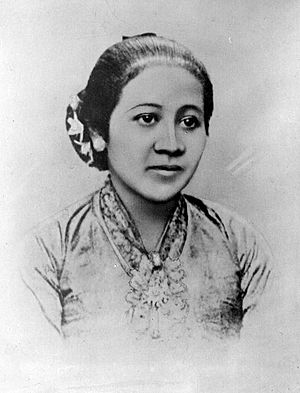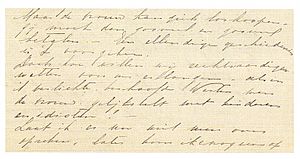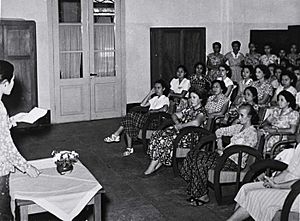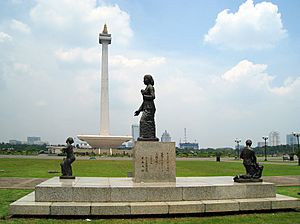Kartini facts for kids
Raden Adjeng Kartini (born April 21, 1879 – died September 17, 1904) was a very important Indonesian activist. She worked hard for women's rights and female education. She is also known as Raden Ayu Kartini.
Kartini was born into a noble Javanese family in the Dutch East Indies (which is now Indonesia). She went to a Dutch-language primary school. After finishing school, she wanted to study more, but Javanese women at that time were not allowed to go to higher education. She met many important people, including J.H. Abendanon, who was in charge of a Dutch policy to improve life in the colonies.
After Kartini passed away, her sisters continued her work. They kept fighting for girls and women to get an education. Kartini's letters were published in a Dutch magazine. Later, in 1911, they became books like Out of Darkness to Light. Today, her birthday is a national holiday in Indonesia, called Kartini Day. Many schools are named after her, and a special fund helps girls in Indonesia get an education.
Contents
Kartini's Early Life and Family
Kartini was born into a noble Javanese family. At that time, Java was a Dutch colony called the Dutch East Indies. Her father, Sosroningrat, became the Bupati (which means a local leader or Regent) of Jepara.
Kartini's mother, Ngasirah, was the daughter of a religious teacher. She was her father's first wife. However, noble families often practiced polygamy, meaning a man could have more than one wife. Colonial rules said that regents had to marry someone from a noble family. Since Ngasirah was not noble enough, Kartini's father married a second time to Woerjan. After this second marriage, her father became the Bupati of Jepara.
Kartini was the fifth of eleven children, including her half-siblings. Her family was very smart. Her grandfather became a regent when he was only 25. Her older brother, Sosrokartono, was a talented linguist, someone who studies languages.
Kartini's Education and Seclusion
Kartini's family let her go to school until she was 12 years old. There, she learned Dutch, which was very rare for Javanese girls back then. After she turned 12, she had to stay at home. This was a common custom for young noble Javanese girls, called pingit or seclusion. It prepared them for marriage. During seclusion, girls could not leave their parents' home until they were married.
Kartini's father was a bit more flexible than others. He allowed her to take embroidery lessons. She could also appear in public sometimes for special events.
During her seclusion, Kartini kept learning on her own. She spoke Dutch very well and wrote to several Dutch pen pals. One of them, Rosa Abendanon, became a close friend. Kartini read many books, newspapers, and European magazines. These readings made her interested in Europe and feminism. Feminism is the idea that women should have equal rights and opportunities as men. She really wanted to improve the lives of Indonesian women, who had a very low social status at the time.
Kartini even sent her own writings to the Semarang newspaper, and they were published! Before she was 20, she had read many important books. These included Max Havelaar and Love Letters by Multatuli. She also read books by other famous European authors. All these books were in Dutch.
Kartini cared about more than just women's rights. She also wanted to fix other problems in her society. She believed that women gaining freedom and equality was part of a bigger movement for justice.
Marriage, Death, and Lasting Impact
Kartini's parents arranged for her to marry Joyodiningrat, the Regent of Rembang. He already had three wives. Kartini did not like the idea of this marriage at first. But her husband understood her dreams. He allowed her to start a school for girls at his office complex in Rembang.
Kartini had her only child on September 13, 1904. Just a few days later, on September 17, 1904, Kartini passed away at the age of 25. She was buried in Bulu Village, Rembang.
Inspired by Kartini, the Van Deventer family started the R.A. Kartini Foundation. This foundation built schools for women. The first 'Kartini's School' opened in Semarang in 1912. More schools followed in other cities like Surabaya and Yogyakarta.
In 1964, President Sukarno declared April 21, Kartini's birthday, as "Kartini Day." This is a national holiday in Indonesia. Some people have criticized this decision. They suggest that Kartini Day should be celebrated with Indonesian Mothers’ Day on December 22. They feel that focusing only on Kartini might overshadow other women who fought for Indonesia's freedom.
However, many people believe Kartini is very important. They say she was a smart thinker who improved the lives of Indonesian women. She was also a nationalist figure with modern ideas. She fought for her people and played a role in Indonesia's struggle for independence.
Kartini's Famous Letters
After Kartini died, J.H. Abendanon, a Dutch official, collected her letters. These were letters she had sent to her friends in Europe. He published them in a book called Door Duisternis tot Licht (Out of Dark Comes Light) in 1911. The book was very popular and was published five times. It was also translated into English as Letters of a Javanese Princess.
The publication of these letters, written by a Javanese woman, created a lot of interest in the Netherlands. Kartini's ideas began to change how the Dutch viewed native women in Java. Her ideas also inspired important leaders in Indonesia's fight for independence.
Some parts of the original letters were changed or removed when they were published. For example, some mentions of colonial figures, Islamic beliefs, and Javanese culture were taken out. The English translation also made more changes. Kartini's original, unedited letters were first published in English in 2014.
Kartini's Important Ideas
Improving Women's Lives
In her letters, Kartini wrote about her thoughts on society at that time. She especially focused on the situation of Indonesian women. Most of her letters protested against Javanese traditions that stopped women from growing and learning. She strongly wanted women to have the freedom to learn and study.
Kartini wrote about her dreams and goals. These included ideas like self-development, self-teaching, self-confidence, and working for oneself. She also believed in working together with others. These ideas were based on faith in God, wisdom, and beauty. She also believed in humanitarianism (caring for others) and nationalism (love for one's country).
Kartini also hoped for support from people overseas. In her letters to a friend named Estell "Stella" Zeehandelaar, Kartini wished to be equal with European women. She described the difficulties Javanese women faced because of tradition. They could not study, were kept at home, and had to marry men they did not know, often in polygamous marriages.
Kartini and Vegetarianism
In letters from October 1902, Kartini told Abendanon and his wife that she wanted to live a vegetarian life. For her, this was a religious choice. She wrote:
Living a life as a vegetarian is a wordless prayer to the Almighty.
Dreams of Further Studies
Even though Kartini's father allowed his daughters to go to school until age twelve, he did not want them to get more education. He stopped Kartini from studying in the Netherlands or going to medical school. However, he eventually allowed her to study to become a teacher in Batavia (now Jakarta).
Later, her plans changed to studying in Tokyo, based on Abendanon's advice. But in 1903, Kartini's plans to become a teacher in Tokyo were dropped because she was getting married. She wrote:
In short, I no longer desire to take advantage of this opportunity because I am to be married.
This happened even though the Dutch Education Department had finally given permission for Kartini and her younger sister, Ayu Rukmini, to study in Batavia.
As her wedding got closer, Kartini's feelings about Javanese traditions changed. She became more accepting. She felt her marriage would help her dream of starting a school for native women. In her letters, she mentioned that her husband supported her wish to develop the Jepara woodcarving industry and a school for women. She also mentioned wanting to write a book. Sadly, she passed away early in 1904, so she could not finish this book.
Kartini's Lasting Legacy
Kartini Schools were opened in cities like Bogor, Jakarta, and Malang. A special group was also created in her name in the Netherlands.
Kartini's image has appeared on Indonesian money twice. She was on the 5 rupiah banknote in 1952 and the 10,000 rupiah banknote in 1985.
Kartini Day Celebrations
President Sukarno declared April 21 as Kartini Day. This was meant to remind women to take part in the country's development. After 1965, under President Suharto's New Order, Kartini's image changed. She was shown more as a dutiful wife and obedient daughter, "as only a woman dressed in a kebaya who can cook." On this day, often called Hari Ibu Kartini (Mother Kartini Day), young girls would wear special outfits. These outfits were supposed to be like Kartini's, but they were actually more restrictive than what she ever wore.
The song "Ibu Kita Kartini" (Our Mother Kartini) by W. R. Supratman: <score lang="ABC" sound="1"> X:173 L:1/4 M:4/4 K:C Q:1/4=120 C3/2D/2EF|G3/2E/2C2|A3/2c/2BA|G3|\ F3/2A/2GF|E2C2|D3/2F/2ED|C3|\ F3/2E/2FA|G/2A/2G/2E/2CE|DEFG|E3|\ F3/2E/2FA|G/2A/2G/2E/2CE|DFB,D|C3| </score>
Tributes to Kartini
On April 21, 2016, Google celebrated Kartini's 137th birthday with a special Google Doodle on its homepage.
See also
 In Spanish: Kartini para niños
In Spanish: Kartini para niños






